-
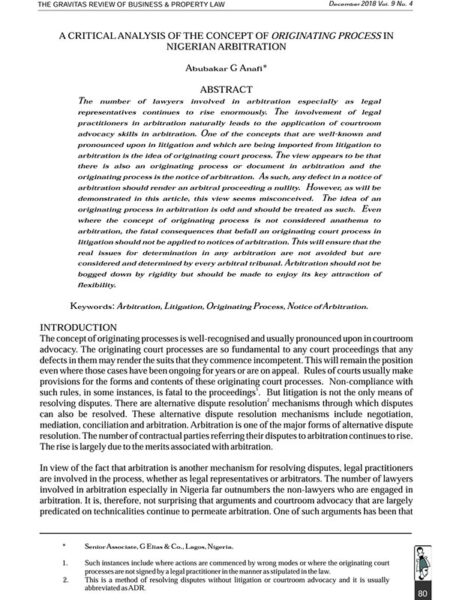
A Critical Analysis of the Concept of Originating Process in Nigerian Arbitration
0₦2,500.00Abubakar Anafi, Senior Associate, G Elias & Co in his article, A Critical Analysis of the Concept of Originating Process in Nigerian Arbitration, observes that the concept of ‘Originating Process’ which is well known in litigation with its strict parameters and devastating consequences, is already percolating the calm, simple and flexible waters of arbitration. Anafi lists 10 reasons why the concept is inapplicable in arbitration. He cautions against imitation of rigid rules of litigation which would ultimately derail the flexibility of the arbitral process.
-
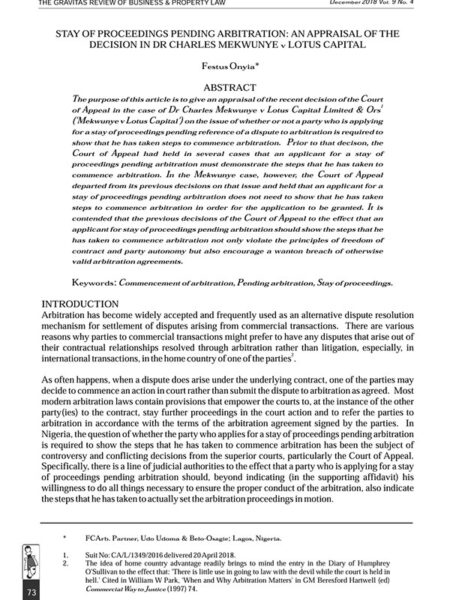
Stay of Proceedings Pending Arbitration: An Appraisal of the Decision in Dr Charles Mekwunye v Lotus Capital
0₦2,500.00Festus Onyia, Partner, Udo Udoma & Belo-Osagie in his article, Stay of Proceedings Pending Arbitration: An Appraisal of the Decision in Dr Charles Mekwunye v Lotus Capital, considers the vexed issue of whether a party who is applying for a stay of proceedings pending reference of a dispute to arbitration is required to show that he has taken steps to commence arbitration. He analyses various Nigerian cases on the issue including the recent decision of the Court of Appeal in Mekwunye v Lotus Capital and concludes that the decision aligns with the current judicial attitude towards arbitration agreements.
-
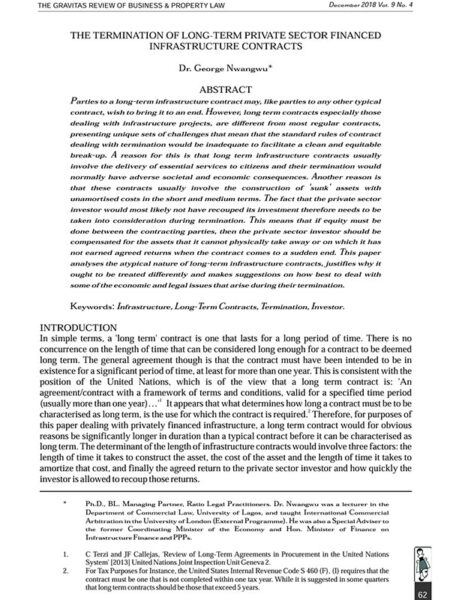
The Termination of Long-Term Private Sector Financed Infrastructure Contracts
0₦2,500.00Dr George Nwangwu, Managing Partner, Ratio Legal Practitioners, and Special Adviser to the former Minister of Finance on Infrastructure Finance and PPPs in his article, The Termination of Long-Term Private Sector Financed Infrastructure Contracts, observes that long-term contracts especially those dealing with infrastructure projects, are different from most regular contracts, presenting unique sets of challenges that mean that the standard rules of contract dealing with termination would be inadequate to facilitate a clean and equitable break-up. Dr Nwangwu analyses the atypical nature of long-term infrastructure contracts, justifies why it ought to be treated differently and makes suggestions on how best to deal with some of the economic and legal issues that arise during their termination.
-
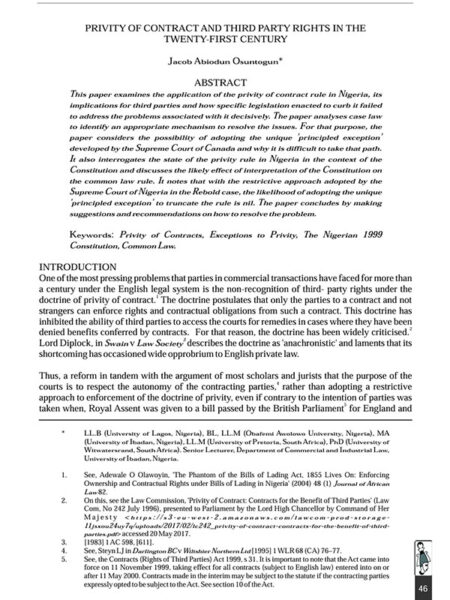
Privity of Contract and Third Party Rights in the Twenty-First Century
0₦2,500.00Dr Jacob Osuntogun of the University of Ibadan in, Privity of Contract and Third-Party Rights in the Twenty-First Century, examines the application of the doctrine of Privity of Contract in Nigeria, and its implications for third parties. He analyses Nigerian cases on the doctrine including the Supreme Court decision in Rebold v Magreola; various exceptions to the Privity rule and how specific legislation enacted to address the inadequacy of the rule have fared. He interrogates the possibility of adopting the unique ‘principled exception’ rule developed by the Supreme Court of Canada and advocates the enactment of comprehensive legislation to address the shortcomings of the doctrine.
-
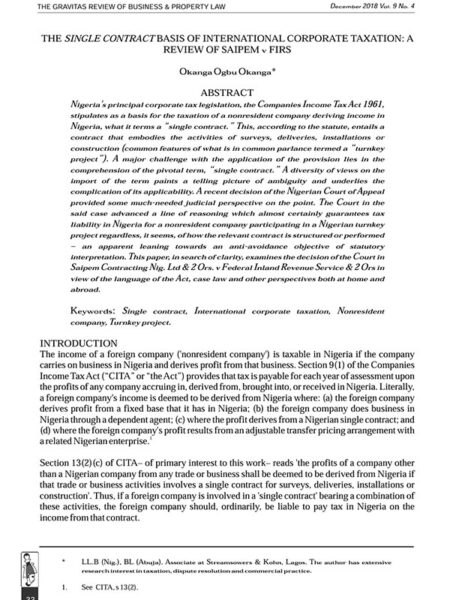
The Single Contract Basis of International Corporate Taxation: A Review of Saipem v FIRS
0₦2,500.00Okanga Okanga, Associate at Streamsowers & Kohn in his article, The Single Contract Basis of International Corporate Taxation: A Review of Saipem v FIRS, examines the tax liability of nonresident companies in single contracts, otherwise known as turnkey projects. He reviews the Court of Appeal’s decision in Saipem v FIRS to the effect that where a turnkey contract is executed by multi-jurisdictional members of a consortium, in so far as the obligations of the individual members are related components of the same project, the entire contract will be taxable in Nigeria irrespective of where the obligations of each member of the consortium were discharged. Okanga advocates a more distilling approach, like in India, such that the substantive intent of the consortium participants, rather than description, will determine liability to tax.
-
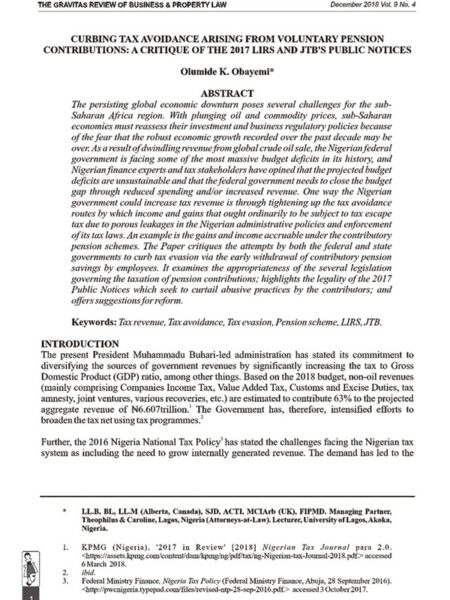
Curbing Tax Avoidance Arising from Voluntary Pension Contributions: A Critique of the 2017 LIRS and JTB’S Public Notices
0₦2,500.00Dr Olumide Obayemi of the University of Lagos in his article, Curbing Tax Avoidance Arising from Voluntary Pension Contributions: A Critique of the 2017 LIRS and JTB’S Public Notices, observes that in order to increase its revenue to fund massive budget deficits, the Nigerian governments have introduced measures to curb tax avoidance mechanisms. One of such measures by the Lagos Internal Revenue Service and the Joint Tax Board is the capping of voluntary pension contributions at 1/3 of employee’s salary and limiting withdrawals from the Retirement Savings Account. Obayemi comprehensively reviews the legality of the measure within the gamut of laws regulating pension of employees in Nigeria and advocates reforms that will enhance clarity over chaos.
-
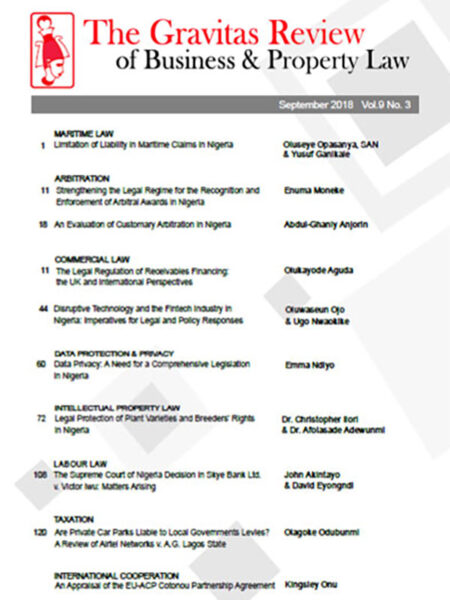
The Gravitas Review of Business & Property Law Vol.9 No.3 – Print
0₦5,000.00In this issue of The Gravitas Review of Business & Property Law Vol.9 No.3, there are well researched articles on:
- Maritime Law
- Arbitration
- Commercial Law & Practice
- Data Protection & Privacy
- Intellectual Property
- Labour Law
- Taxation
- International Cooperation
-

The Gravitas Review of Business & Property Law Vol.9 No.3 – E-Book
0₦5,000.00In this issue of The Gravitas Review of Business & Property Law Vol.9 No.3, there are well researched articles on:
- Maritime Law
- Arbitration
- Commercial Law & Practice
- Data Protection & Privacy
- Intellectual Property
- Labour Law
- Taxation
- International Cooperation
-

The Gravitas Review of Business & Property Law Vol.9 No.3
0₦5,000.00In this issue of The Gravitas Review of Business & Property Law Vol.9 No.3, there are well researched articles on:
- Maritime Law
- Arbitration
- Commercial Law & Practice
- Data Protection & Privacy
- Intellectual Property
- Labour Law
- Taxation
- International Cooperation
-
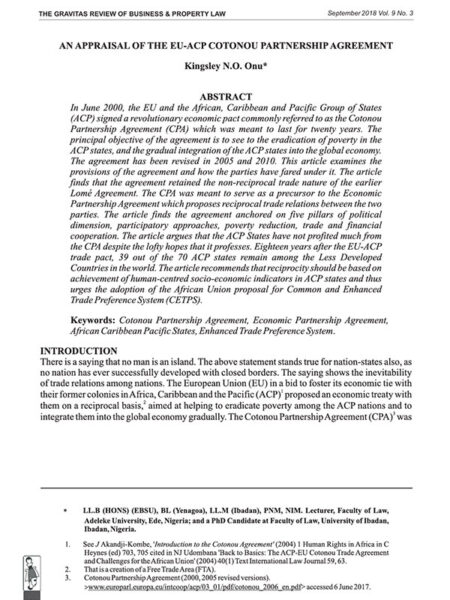
An Appraisal of the EU-ACP Cotonou Partnership Agreement
0₦2,500.00Kingsley Onu, Lecturer, Faculty of Law, Adeleke University, Ede in his article An Appraisal of the EU-ACP Cotonou Partnership Agreement, examines the provisions of the CPA signed in June 2000 in Cotonou between the European Union and the African, Caribbean and Pacific Group of States (ACP) and the Revisions of 2005 and 2010. He notes that the principal objective of the agreement is the eradication of poverty in the ACP states and their integration into the global economy. He argues that the goals have not been met as 39 out of the 70 ACP states remain among the Less Developed Countries (LDCs) in the world. He advocates for cooperation and reciprocity between EU and ACP based on human-centred socio-economic indicators, and recommends the adoption of the African Union proposal for Common and Enhanced Trade Preference System (CETPS).
-
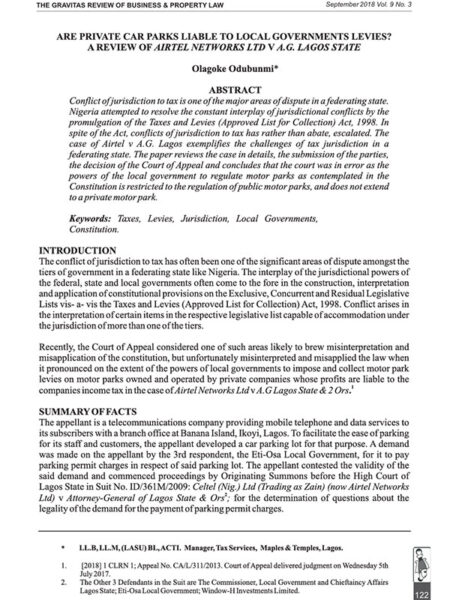
Are Private Car Parks Liable to Local Governments Levies? A Review of Airtel Networks Ltd v A.G. Lagos State
0₦2,500.00Olagoke Odubunmi, Manager Tax Services, Maples and Temples is his article, Are Private Car Parks Liable Local Governments Levies? A Review of Airtel Networks Ltd A.G. Lagos State observes that the conflict of jurisdiction to tax has often been one of the significant areas of dispute amongst the tiers of government in a federating state like Nigeria. The interplay of the jurisdictional powers of the federal, state and local governments often come to the fore in the construction, interpretation and application of constitutional provisions on the legislative powers of each tier. Odubunmi reviews the decision of the Court of Appeal in the Airtel’s case on the extent of the powers of local governments to impose and collect motor park levies on parks owned and operated by private companies for the benefit of their employees.
-
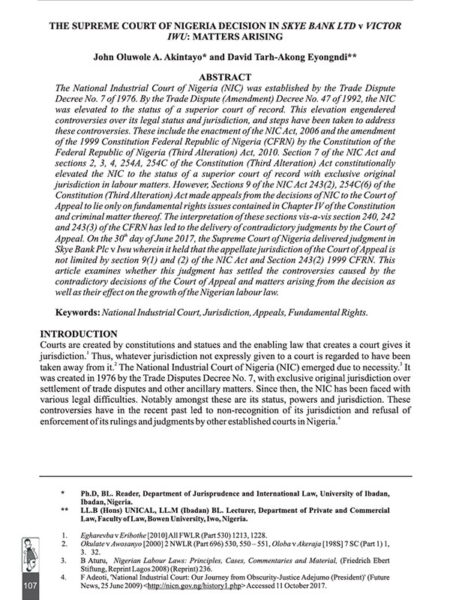
The Supreme Court of Nigeria Decision in Skye Bank Ltd v Victor Iwu: Matters Arising
0₦2,500.00John Akintayo, Reader, Department of Jurisprudence and International Law, University of Ibadan and David Eyongndi of the Department of Private and Commercial Law, Bowen University in their article, The Supreme Court of Nigeria Decision in Skye Bank Ltd. v. Victor Iwu: Matters Arising, consider the Iwu’s case as pivotal in the chequered jurisdictional history of the National Industrial Court (NIC). They analyse the relevant provisions of the NIC Act, 2006 and the Constitution of the Federal Republic of Nigeria (Third Alteration) Act, 2010. They examine the matters arising, and the unintended consequences of the decision in Iwu: that the appellate jurisdiction of the Court of Appeal to entertain appeals from the National Industrial Court is not restricted to fundamental rights issues contained in Chapter IV of the Constitution.
The Gravitas Review of Business & Property Law



